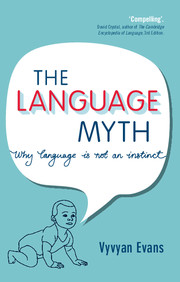Book contents
- Frontmatter
- Dedication
- Epigraph
- Contents
- Acknowledgements
- 1 Language and mind rethought
- 2 Is human language unrelated to animal communication systems?
- 3 Are there language universals?
- 4 Is language innate?
- 5 Is language a distinct module in the mind?
- 6 Is there a universal Mentalese?
- 7 Is thought independent of language?
- 8 Language and mind regained
- Notes
- References
- Index
7 - Is thought independent of language?
Published online by Cambridge University Press: 05 October 2014
- Frontmatter
- Dedication
- Epigraph
- Contents
- Acknowledgements
- 1 Language and mind rethought
- 2 Is human language unrelated to animal communication systems?
- 3 Are there language universals?
- 4 Is language innate?
- 5 Is language a distinct module in the mind?
- 6 Is there a universal Mentalese?
- 7 Is thought independent of language?
- 8 Language and mind regained
- Notes
- References
- Index
Summary
Myth: Thought is independent of and cannot be dramatically influenced by language. The idea that systematic patterns in grammatical and semantic representations across languages give rise to corresponding differences in patterns of thought across communities (the principle of linguistic relativity) is utterly wrong.
The Holy Roman Emperor, Charles V, who ruled from 1519 to 1556, is often claimed to have uttered the following: “I speak Spanish to God, Italian to Women, French to Men, and German to my Horse.” The idea, of course, is that each language has a particular character associated with it, which lends itself to specific functions: Spanish is the Linguica Domnichi, literally ‘Language of God’; Italian is the ‘Language of Love’; French is the ‘Language of Diplomacy’; and German, with – some say – harsh, guttural sounds, is ideal for giving orders. But a number of researchers have gone further than this. It has been proposed that the distinct character of a language gives rise to wholesale differences in the way its native speakers think, and the manner in which we perceive the world: different languages entail a distinctive worldview. The way a language encodes space, time, colour, or any other domain has profound consequences for how its speakers perceive those domains of experience in their everyday lives. This idea is often referred to as linguistic relativity: differences across languages give rise to corresponding differences in how speakers of a given language think, and how they perceive the world.
- Type
- Chapter
- Information
- The Language MythWhy Language Is Not an Instinct, pp. 192 - 228Publisher: Cambridge University PressPrint publication year: 2014



